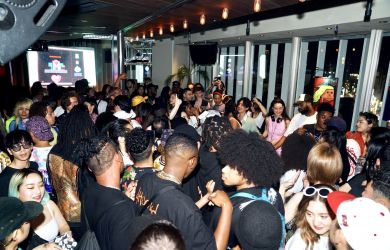
Originally published on metropolis.co.jp on July 2013

[youtube]Sg7WpdJYryk[/youtube]
With the release of her debut single “Look of Love,” Jamaican vocalist Monique Dehaney has arrived at a watershed moment in a unique career carving out her niche as a singer in Japan. Blessed with a full-bodied voice and the ability to shift seamlessly from reggae to pop to soul and more recently, jazz, Dehaney has performed with talents both Japanese and foreign. These days the petite, vivacious songstress with an infectious laugh maintains a heavy schedule on the club and stage scene. Metropolis sat down with Dehaney to find out more about her background and musical goals.
Where exactly in Jamaica are you from? Talk a bit about your early life.
I’m from Montego Bay, from a beautiful little community called Unity Hall. My early life was all about church. Every aspect of my life was church: friends, all my friends were church friends, all my going out activities were related to church; I was on the church choir.
You have been a performer since childhood. But your focus as a kid was more on dancing rather than singing. How come?
I was mostly a dancer, choreographer… I was in the church choir but I had serious ADD. I couldn’t focus on the singing. I like to be active and busy busy. Dancing was that but singing required sitting down and being very focused. I’m still struggling with that right now.
Growing up in Jamaica in the 1980s and 90s, what kind of music were you exposed to?
My mother and father are divorced, so at my father’s house I would hear Diana Ross, Michael Jackson, Lionel Ritchie… lots of the Supremes, lots of Celine [Dion]; Whitney [Houston] was there, too, lots of Temptations. At my mother’s house there was never much music—except when she was gone we would turn on the radio. For a while I was really into DMX. No matter what my mother did she couldn’t get me to stop listening to DMX… She destroyed my CDs, destroyed my tapes, everything…
You were set to pursue graduate studies at Johns Hopkins University, but ended up as a participant in the Japan Exchange and Teaching Program…
I had completed my applications and everything looked promising, when one of my professors said to me, “Monique, you are a good student but this is not what you need to be doing. You need to go travel and really see who you are.” I did that, and it has been eight years.
Your first port of call was not Tokyo, was it?
No, it was Kochi City (in Shikoku) or Little Jamaica, as I call it. Back then they had restaurants serving Jamaican food, they had Jamaican clubs—it’s a very small town and they had clubs, and there were a lot of people who were into Jamaica and Jamaican music and culture.
And it was in Kochi where you started singing seriously?
In my first week in Kochi I went into a bar all the foreigners frequented. I guess I was one of the first black female ALTs he had ever met? I don’t know what happened but the owner of the bar sent the bartender to ask me if I wanted to join their band, without even finding out f I could sing, or anything like that. I guess he thought I would just be a face, or something cool. I was only 21, 22 at the time. It was… an American old-school funk, hip-hop kind of band. They did a lot of Incognito, you know, jazz-funk stuff. Anyway, at band practice they were kind of disappointed that, lo and behold, I could actually sing. Anyway, they kept me in the band and I stayed with them for a year.
Why did you come to Tokyo?
I was on JET for two years and then I came to Tokyo to continue teaching English. One night someone invited me to perform at a show at Crocodile, and I guess the right people were there and I started getting job offers.
What made you decide that getting into performing full-time was a viable proposition?
One, I felt very good doing it whenever I was doing it. So that tells you something; if your body responds well to something, then that’s what you should be doing. And, also, financially, it was more beneficial.
You are carving out a unique niche in the Japanese music industry, as a female, Jamaican singer. What has that process been like?
Not very easy! Initially, it was hard to get on the scene because the majority of professional singers are Americans, and, for whatever reason, Japanese people have the idea that only black Americans sing soul. I was expected to only know reggae, and that kind of stuff. And they tried to put me in one category for the longest while, of only reggae, because I’m from Jamaica.
What have some of the highpoints of your career been so far?
The highest point of my career up to now has been working with Atsushi Sato from Exile. That was a nice gig. I worked with him for a year or more doing backup vocals on his debut release.
Who else have you worked with?
In terms of Jamaican artistes, I’ve worked with Black Uhuru’s Michael Rose, which was an amazing experience! The man is a genius! I’ve worked with so many Japanese artistes, including Mika Nakajima…but, in the future, I want to work with this young, upcoming Jamaican artiste called Chronixx.
So, what’s happening with you at the moment?
I’ve just released my debut single, “Look of Love,” which is a reggae-infused pop track. I’m working on reggae/jazz shows; I’ll be featured on a compilation, a reggae-jazz compilation CD (to be produced by top Jamaican multi-instrumentalist/producer Courtney Panton). I’m looking to release more music and, eventually, an EP at the end of this summer.
Are you working with a particular producer?
No, I’m pretty much doing this by myself, working with some producers in Jamaica and producers here in Japan. I’m also doing a summer island version of the popular Kyu Sakamoto hit “Ue o Muite” (“Sukiyaki”), and hopefully we’ll have it ready in a month.
Where did the fascination with jazz come from?
One day somebody said to me, probably you want to be focused on singing jazz, as you have a good voice for it… Once you’re opened up to jazz the fascination pretty much never ends.
How has the new single been performing, so far?
It’s been doing pretty well. The first week we were number 13 on Amazon downloads, which is pretty good, for someone promoting on their own.
You wrote the lyrics for “Look of Love.” When did you start writing songs?
Songwriting started when I took an office job and was bored out of my mind. I had time on my hands and I started writing at the desk and I ended up writing over 20 complete songs in the space of six months. Writing is just all about my life experiences. I usually just think of a melody in my mind and write lyrics to it.
Looking ahead, what are your some of your other plans, hopes, dreams?
I’d love to debut in my own country and be known [there] as a Jamaican singer able to sing in different genres. But at the same time, the market in Jamaica is pretty saturated… and when it comes on to organization Jamaica is not the best place. But [that’s] a dream deferred.





